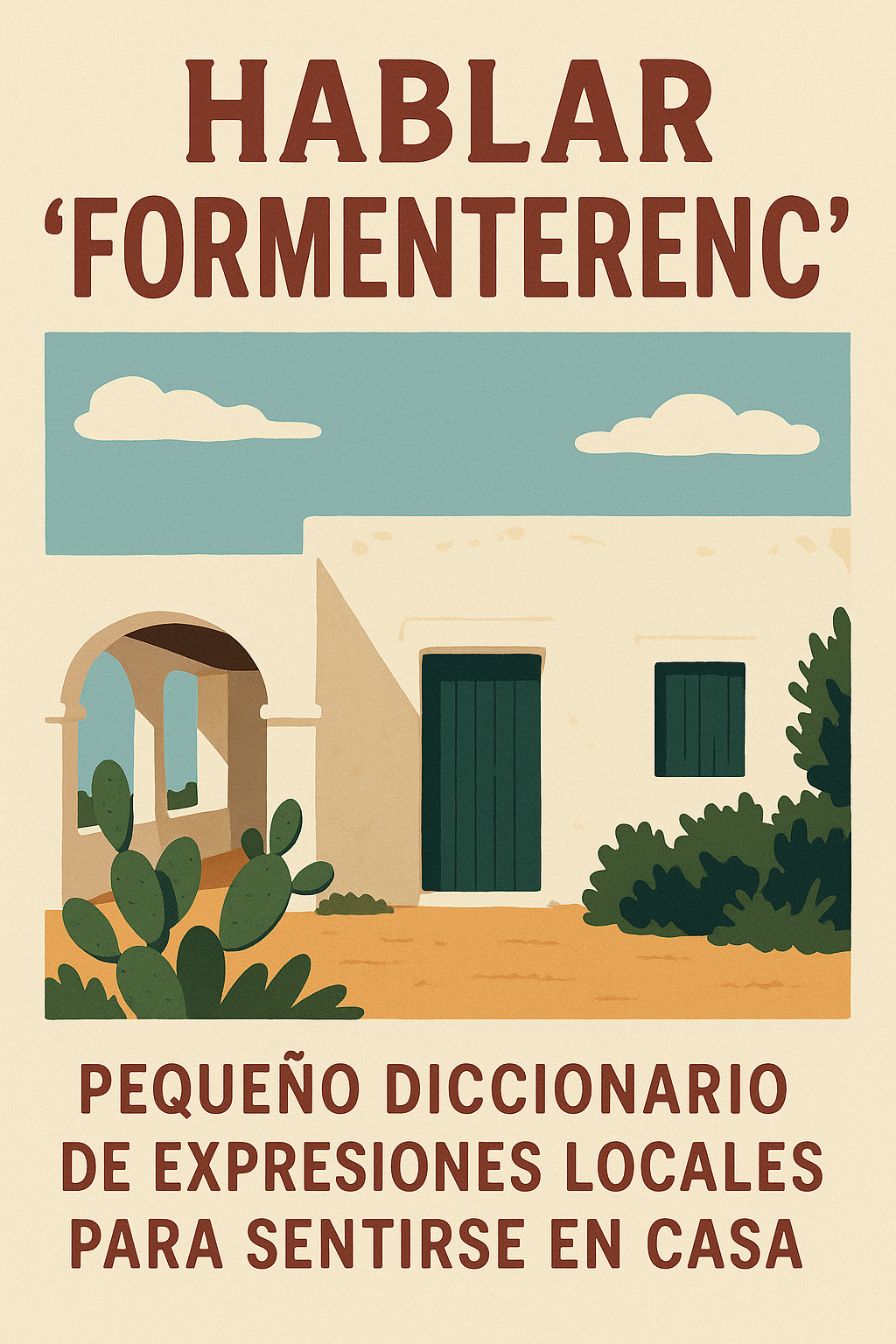Speaking “Formenterenc”: A Little Dictionary of Local Expressions to Feel at Home

Introduction: The Soul of Formentera in a Sant Ferran Bar
Picture the scene. You’re sitting in a small bar in Sant Ferran, far from the summer crowds. At the counter, two elderly men, their skin weathered by sun and salt, are talking. They’re not speaking Castilian Spanish, nor the Catalan you might hear in Barcelona. Their words have a different musicality: tighter, almost sung. You are listening to the heartbeat of Formentera’s culture: its dialect, the formenterenc.
Understanding a few words of this ancient language isn’t just a curiosity for adventurous tourists. It’s the quickest and deepest way to cross the invisible barrier between those who visit the island and those who live there. It’s a gesture of respect that will open doors, smiles, and perhaps even the soul of a place with much more to share than its beaches.
This isn’t a language lesson—it’s a toolbox of local expressions to help you feel, even just for a while, wonderfully at home.
A Little Order: Catalan, Eivissenc and Formenterenc
Before we dive into colorful expressions, let’s clarify: what language is spoken in Formentera?
The official languages, along with Spanish, are Catalan and its local variants. Each Balearic Island has its own flavor (Mallorquí in Mallorca, Menorquí in Menorca). In Ibiza and Formentera, people speak Eivissenc, and the version spoken in Formentera has its own peculiarities, affectionately known as Formenterenc.
Key Characteristics of Formenterenc
- The “salat” article: the most noticeable difference. While standard Catalan uses el and la, here you’ll hear es and sa. For example: not la platja (the beach), but sa platja. This archaic feature, shared across the islands, immediately transports you into a more ancient Mediterranean dimension.
- Vowel pronunciation: vowels are “closed.” The final e is almost silent, and unstressed o often sounds like u. It’s a language that feels almost chewed, economical in sound, as befits a people used to wasting nothing.
Don’t worry about understanding every word. What matters is catching the music—and the meaning behind the words.
The Little Dictionary to Survive (and Smile)
Greetings: The Key to Connection
- Bon dia / Bona tarda / Bona nit
Meaning: “Good morning / Good afternoon / Good night.” Classic formal greetings. Saying Bon dia instead of Buenos días will be a small gesture that locals truly appreciate. - Adéu!
Meaning: “Goodbye!” Used just like “see you” or “bye” when leaving. Simple and effective. - Molt d’anys!
Meaning: literally “Many years!” This is one of the most beautiful and puzzling expressions. It’s not only for birthdays—it’s used for any happy occasion: a saint’s day, an anniversary, a patron’s festival, even Christmas or Easter. It’s a wish of long life and happiness, reflecting a strong sense of community.
Funny anecdote: An Italian friend, after learning the expression, used it with a bar owner on his birthday and got a big smile. A few weeks later, during the Sant Jaume festival, he heard everyone saying “Molt d’anys!” and asked, confused: “Wait… is it everyone’s birthday?” The explanation fascinated him: it’s a blessing extended to the whole community on a day of celebration.
Everyday Expressions
- Què dius ara!
Meaning: literally “What are you saying now!” It’s the go-to phrase to show surprise, disbelief, or astonishment. Equivalent to “No way!”, “Really?” or “You’re kidding!”. Perfect when someone tells you gossip or unexpected news. - Tira, tira!
Meaning: literally “Pull, pull!”. A versatile encouragement: “Come on, hurry up!”, “Keep going!”, “Go for it!”. You’ll hear it said to a child learning to ride a bike or to a friend hesitating before jumping into the water. - Poc a poc
Meaning: “Little by little.” More than an expression, it’s Formentera’s philosophy of life in two words. It means doing things calmly, without rushing, respecting nature’s pace and your own rhythm. If someone says poc a poc while you’re in line, it’s not a complaint—it’s an invitation to relax and embrace the local rhythm. - Pagès (pronounced pa-yés, with a soft g)
Meaning: literally “farmer.” But it goes much deeper. Pagès means authentic, local, genuine. An ensalada payesa is the traditional salad, a casa payesa is the typical rural farmhouse. To be pagès is a badge of pride, proof of deep roots in this land.
Pronunciation Tips for the Brave
Don’t aim for perfection, just to be understood. Two golden rules:
- The final e is almost silent. In words like nit (night) or poc (little), the vowel is clipped, barely there.
- The neutral vowel: many unstressed e’s sound like a faint, indistinct “a” (the schwa, as in the first syllable of about). Don’t overthink it—just listen to locals and try to imitate their musicality.
Learning these few words won’t make you fluent, but it will give you something far more precious: a key. The key to starting conversations, showing interest, and turning a simple transaction into a human exchange.
Formentera and Its Language: Pride, Roots, and Hospitality
The people of Formentera are proud of their island and their language, which has survived invasions, poverty, and isolation.
So next time you walk into a bar, take a deep breath and give it a try. Poc a poc, you’ll discover an entire world.
